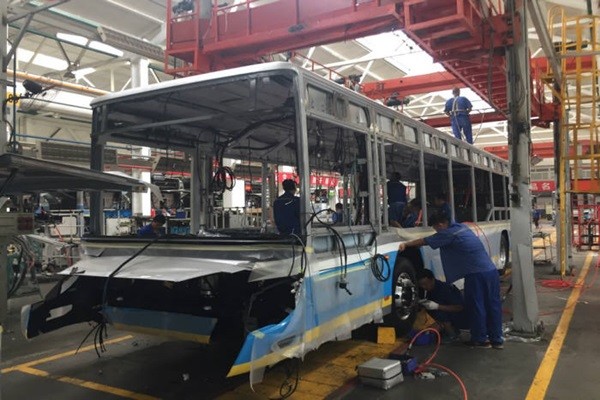It has been confirmed that Chinese Government is currently carrying out an investigation on whether Chinese products are receiving an unfair treatment within the electric vehicle market in South Korea. Due to the reduction of market shares of Chinese electric buses within the South Korean market, Chinese Government is investigating whether Chinese electric buses as well as LFP battery that is mostly used by Chinese companies for electric vehicles and electric buses are discriminated within the South Korean market.
However, Chinese Government has excluded electric vehicles equipped with South Korean batteries from receiving financial support for four years. As a result, South Korean industries believe that there needs to be a fair competition structure between South Korea and China before Chinese Government starts blaming South Korea for the reduction of market shares of Chinese electric buses.
According to the industry, Chinese Government has started investigating Chinese electric bus companies and exclusive electric bus sales companies that have entered the South Korean market. It has yet to come into contact with Ministry of Environment (ME) and Ministry of Trade, Industry, and Energy (MOTIE) that are responsible for policies on the electric bus market in South Korea and supply of electric bus. It will be interesting to see how Chinese Government will utilize the results from its investigation.
BYD, Beijing Automotive Group Co., Ltd. (BAIC), FOTON MOTOR, and Higer Bus have entered the South Korean market. BYD and FOTON are currently ranked first based on sales volume of electric vehicles in China and market shares of commercial vehicles such as bus in China respectively.
“We have recently received calls from Chinese Embassy on whether we have received any unfair treatment or discrimination during our business activities or public bidding process in South Korea.” said a high-ranking official of a Chinese electric bus manufacturer. “Face-to-face meetings also seem likely based on our answers.”
Chinese Embassy is investigating general information such as the current state of supply of electric buses and the current state of the electric bus industry in South Korea, fairness of evaluation on the performance and biddings of electric bus carried out by local governments, and discrimination of LFP (Lithium Ferrophosphate) battery that usually goes into Chinese electric buses.
It is yet known on how Chinese Government is going to utilize the results from its investigation. Although South Korean industries believe that the investigation is just a simple investigation of South Korea’s electric bus market, some also believe that this is the beginning step towards raising a discrimination issue towards Chinese electric bus and battery.
“We know that Chinese Government is conducting its investigation because many Chinese companies were eliminated from a bidding that was recently carried out by a local government.” said a representative for another Chinese company. “Considering the fact that Chinese Embassy is conducting an investigation, it seems that Chinese Government is seeing this issue as a significant issue.”

Actually, Chinese electric buses were responsible for 36% of the market shares of South Korea’s electric bus market between 2017 and 2018 and 88 Chinese electric buses out of 243 electric buses in South Korea received subsidies that were paid by ME and Ministry of Land, Infrastructure and Transport (MOLIT) to low floor electric buses. However, the market shares fell to 10% this year as there are only 47 Chinese electric buses out of 456 electric buses in South Korea.
South Korean Government currently pays between $172,000 (200 million KRW) and $257,000 (300 million KRW) of a government subsidy per electric bus.
Barrier of South Korea’s electric bus market is actually not high for Chinese electric buses. Based on ‘large-scale manufacturer certification system’ that was signed through FTA (Free Trade Agreement) between South Korea and China, Chinese electric buses receive same qualification as South Korean vehicles as long as they pass document screening. There is not any test to verify powertrain including electric motor.
Chinese electric buses receive same government subsidy as South Korean vehicles regardless of the percentage of South Korean parts and the area of production. Considering the fact that the cost of a Chinese electric bus is around $257,000, it actually costs about $86,000 (100 million KRW) to purchase a Chinese electric bus.
On the other hand, Chinese Government has been discriminating South Korean electric vehicle batteries since early 2016. As a result, LG Chem, Samsung SDI, and SK Innovation, which are the top three South Korean battery manufacturers, have yet to perform normal operations in China even though they have invested millions and billions of dollars to construct huge plants in China. Most of 20 Chinese automotive manufacturers that are customers of the three South Korean battery manufacturers receive batteries from Chinese companies.
In order to sell cars such as electric vehicle or electric bus in China, a company needs to establish a joint corporation with a Chinese company including technology transfer and production transfer.
“Unlike how South Korean companies can only enter the Chinese market by establishing a joint corporation with a Chinese company and constructing a huge facility, Chinese electric bus manufacturers can enter the South Korean market without any issue.” said CEO of a South Korean company. “There needs to be a fair market structure so that South Korean and Chinese companies can carry out proper trades.”
Staff Reporter Park, Taejoon | gaius@etnews.com